10 AI Tools For Healthcare Practices

Artificial intelligence is certainly not a new idea. Historically, however, the masses have largely viewed AI technologies with some level of skepticism, confusion, and/or apathy. That changed in November of 2022 when OpenAI released their prototype of ChatGPT to the public.
As ChatGPT went viral, the conversational ripples around AI suddenly became a mainstream tsunami. Existing AI companies benefited from the fresh public interest, while companies like Google, Bing, and Adobe rushed to release their own prototype AI tools.
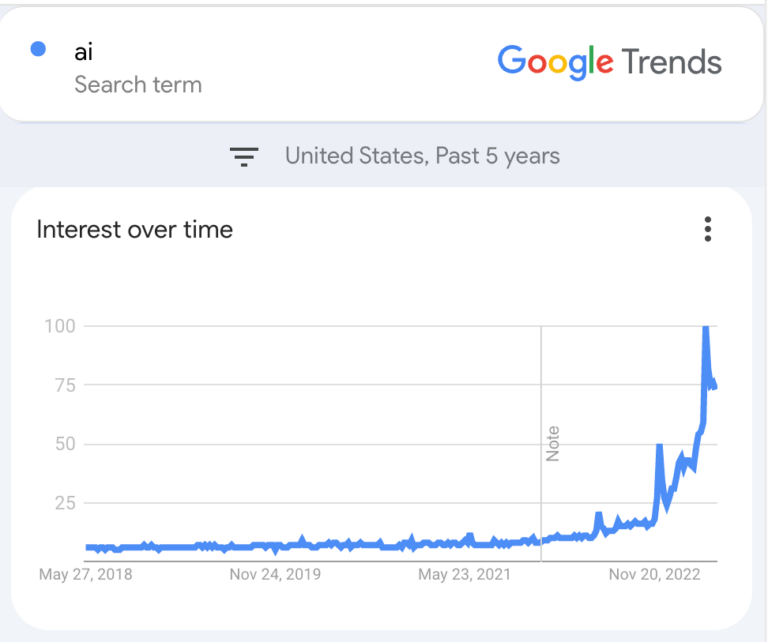
Google Trends shows the popularity of the search term “AI” over time
2023 is definitively the year of AI. Savvy business leaders are seeking ways to leverage AI ahead of their competition, are exploring how AI can impact their bottom line, and are keeping an eye on future technologies. Meanwhile, tech companies are increasingly rushing to meet that demand.
AI Software Healthcare Practices Can Use
New AI tools will continue to crop up and evolve, but there are some interesting players already on the scene. If you’re running a healthcare practice, here are some of the technologies you may want to be aware of:
ChatGPT (Free)
ChatGPT is not a healthcare-specific platform, but it has many potential uses for both personal and professional productivity. Functionally, it is simply a chatbot. You type prompts and it responds. However, you can also think of it as a virtual assistant with the collective knowledge of the internet. It will produce nearly anything you ask for, and with near-instant response-times. It can translate languages, write poetry, develop code, answer questions, write a novel, solve math problems, and more. Give it a brief outline and it can produce a fully-written document. Feed it a complex document and it will make it easy-to-understand. It is hard to detail everything that is possible with ChatGPT, but you may find it to be a helpful productivity tool. Give it a spin for yourself.
https://openai.com/blog/chatgpt
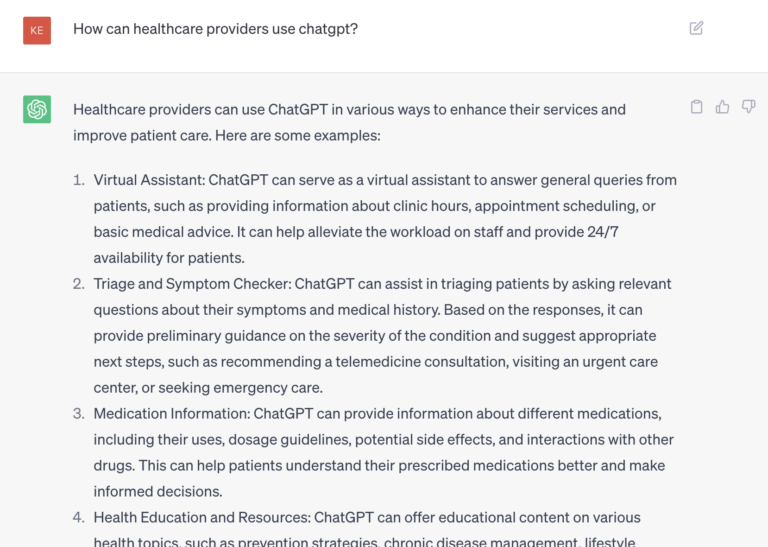
You can even ask ChatGPT how to use ChatGPT
Infermedica
“Infermedica’s mission is to make healthcare accessible, convenient, and affordable for everyone, by automating primary care from symptom to outcome.” This company helps practices conduct pre-visit intake through symptoms analysis so that patients get the proper care. The practice will have a list of probable conditions so they aren’t wasting time and resources, and the patient will have a better experience. They also aid in collecting up-to-date patient information. They can then aid in documenting the visit, treatment follow-up plans, and post-visit checkups.
https://infermedica.com/
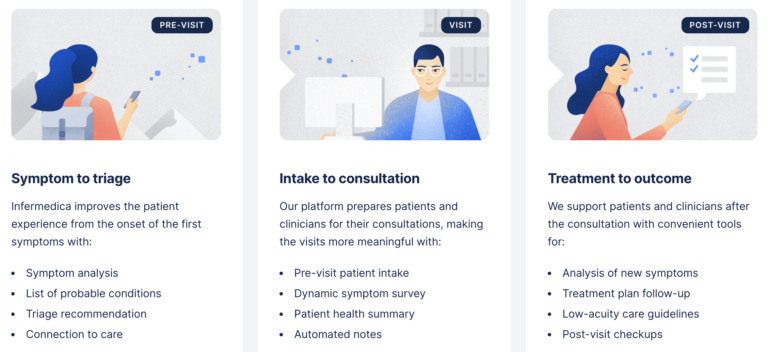
Abridge & DeepScribe
There are a handful of platforms aiming to simplify and/or enhance note taking. Simple transcription has been around for a while, but now AI can simply listen to conversations and create concise notes for you. These tools come in various levels of complexity and with different levels of EHR integrations. They aim to save hours per day by turning conversational speech into clinical documentation.
https://www.abridge.com/
https://www.deepscribe.ai/
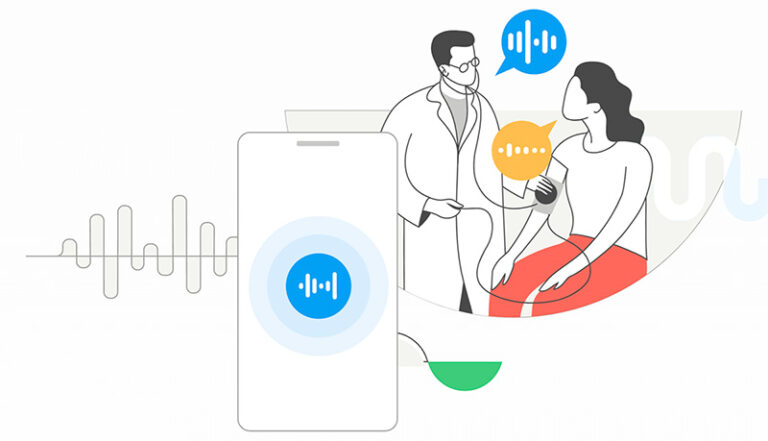
Regard
Regard is another note taking platform, but attempts to do a bit more. It is designed to be more of a virtual assistant between the provider and the EHR. It curates and reviews patient data, shortens chart review, suggests diagnoses, and helps catch issues.
https://withregard.com/
Humata
Humata allows you to get simple summaries from complex research papers. This startup is similar to ChatGPT – heck, it might even be using GPT under the hood. Imagine having someone in front of you who already understands a complex document, is able to summarize and explain it, and can answer any questions you have.
https://www.humata.ai/
Liine
Of course we’d include ourselves! Liine helps healthcare practices with lead management and follow-up, but has an AI secret weapon. Liine automatically captures and tracks every patient lead, while an advanced conversational AI is able to understand what happens on every phone call. This enables Liine to collect analytical data for each lead that would be impossible to accurately capture manually. Practices can easily report their number of new leads, how many converted to appointments, marketing channels for each, reasons patients are NOT booking, individual call staff performance, treatments requested, and more. Liine customers are able to make data-driven decisions for marketing, operations, and staff training.
www.liine.com
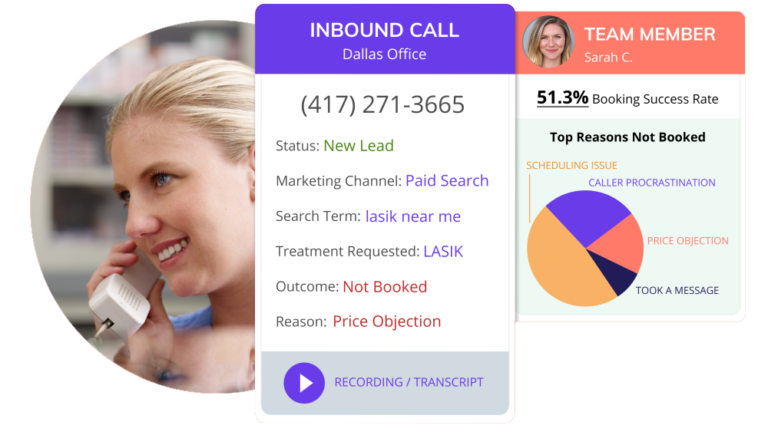
AI Technologies That Healthcare Practices Should Watch
Buoy
Buoy is an AI chatbot for patients to explore their symptoms and recommends potential next steps for care. While this is not a tool designed for healthcare providers to use, you should be aware that these types of platforms are being developed -and your patients may mention them. Perhaps this will be a better WebMD where patients arrive better informed and less stressed. Perhaps.
https://www.buoyhealth.com/
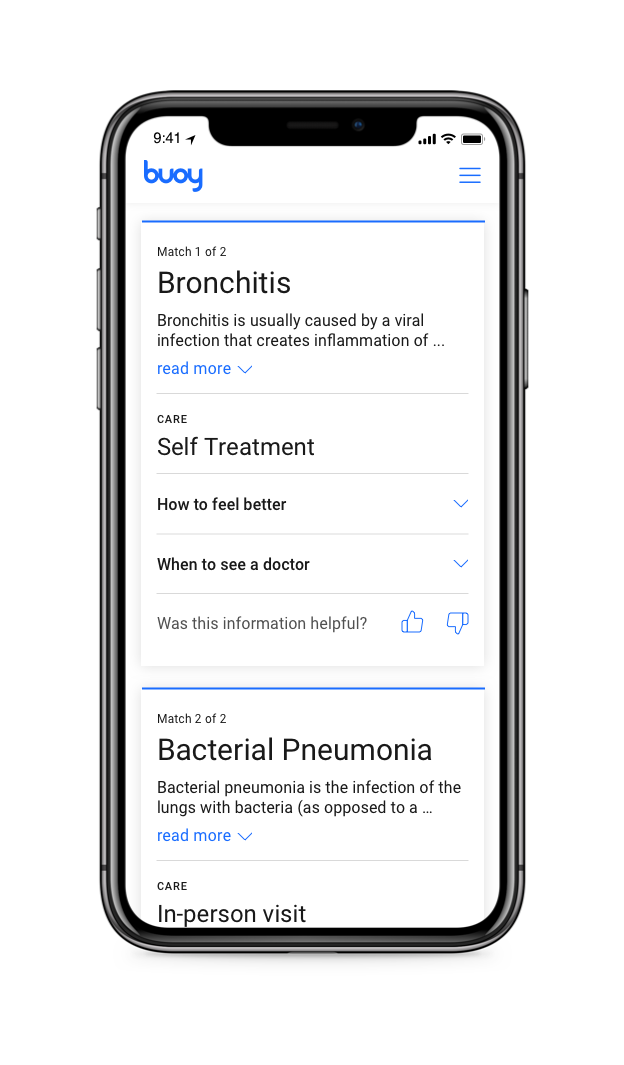
Google Bard & Bing Chat (Free)
We won’t recommend that you rush to use these, but you should definitely be aware of them. Released on the heels of ChatGPT, Google and Bing both released chatbots of their own. Imagine if you could not only search Google.com for websites that answer your questions, but could also get direct answers from Google’s AI. That seems to be the direction these companies are headed in. As the search engines evolve, this could have major impacts to the SEO that is driving business to your practice.
https://bard.google.com/
https://www.bing.com/new
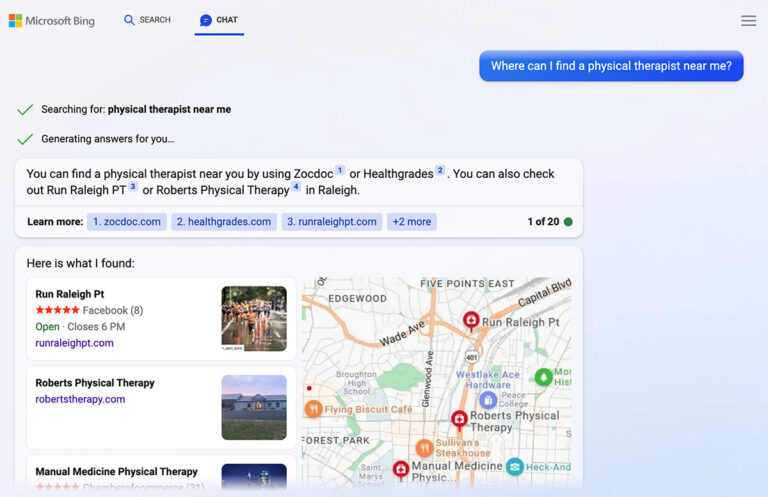
More To Come
We will release updates to this list in the future as the landscape inevitably continues to evolve. Did we miss any useful tools? Let us know on our socials below!